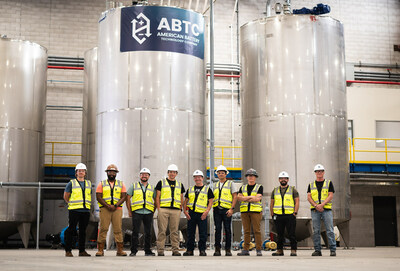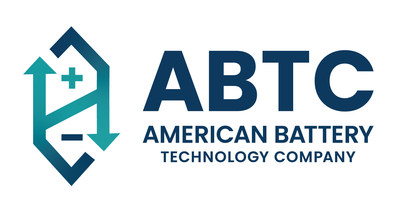American Battery Technology Company Announces Start of Operations at its Commercial-Scale, Lithium-Ion Battery Recycling Facility in Nevada
Signals significant milestone in commencing revenue-generating operations and introducing recycled battery-grade metals to secure US-battery metals supply chain
"We are excited to have achieved this major milestone and to now be generating commercial-scale quantities of domestic recycled battery metal products," stated ABTC CEO Ryan Melsert. "By securing our move-in-ready industrial facility in early 2023, we were able to greatly accelerate our timeline to operations, and the last step of receiving approvals for the updated operational permits for our specific internally-developed processes were received over the past week."
ABTC's first-of-kind integrated battery recycling system utilizes a strategic de-manufacturing and targeted chemical extraction train in order to recover battery materials with high yields, low cost, and with a low environmental footprint. These processes are fundamentally different than conventional methods of battery recycling, which utilize high temperature furnaces, such as in smelting operations, or non-strategic shredding or grinding systems. The ABTC system results in efficient separation, recovery, and purification of high-value battery-grade products with less environmental impact and greater cost efficiencies than conventional methods.
This commercial facility has the capacity to process over 20,000 metric tonnes of battery feedstock materials per year when fully ramped, and this first phase of operations will process these battery feedstock materials into recycled products including copper, aluminum, steel, a lithium intermediate, and a black mass intermediate material that will be sold through an already executed marketing agreement with the global metals trader TechMet-Mercuria. Once the second phase of this integrated recycling facility is operational, this lithium intermediate will be further refined into a battery grade lithium hydroxide product, and the black mass intermediate material will be further refined into battery grade nickel, cobalt, manganese, and lithium hydroxide products.
"Our research & development, engineering, project management, and operations teams have been working with the commissioning of this facility as our highest priority, and we are proud to have accelerated our timelines to have installed our first piece of equipment within a month of gaining access to this new site, and to now have begun commercial operations less than six months later," stated Andrés Meza, chief operating officer for American Battery Technology Company. "We appreciate
ABTC has been validating and optimizing its first-of-kind recycling technologies for several years, and has showcased its innovation through winning the battery recycling portion of the competitively awarded BASF-sponsored Circularity Challenge; through a
About American Battery Technology Company
American Battery Technology Company (ABTC), headquartered in
Forward-Looking Statements
This press release contains "forward-looking statements" within the meaning of the safe harbor provisions of the
![]() View original content to download multimedia:https://www.prnewswire.com/news-releases/american-battery-technology-company-announces-start-of-operations-at-its-commercial-scale-lithium-ion-battery-recycling-facility-in-nevada-301953607.html
View original content to download multimedia:https://www.prnewswire.com/news-releases/american-battery-technology-company-announces-start-of-operations-at-its-commercial-scale-lithium-ion-battery-recycling-facility-in-nevada-301953607.html
SOURCE American Battery Technology Company









